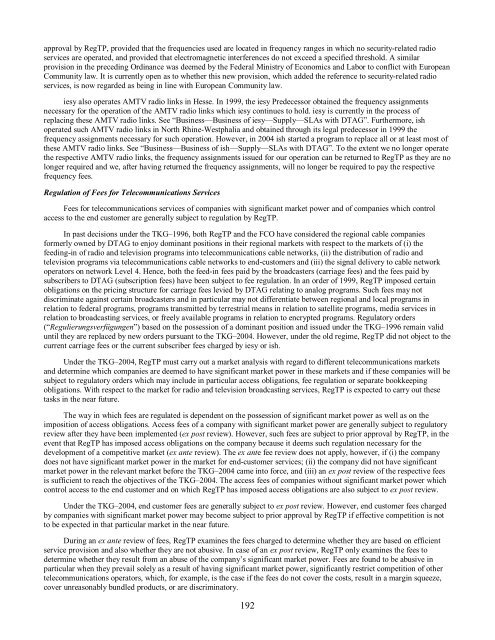iesy Repository GmbH - Irish Stock Exchange
iesy Repository GmbH - Irish Stock Exchange
iesy Repository GmbH - Irish Stock Exchange
Create successful ePaper yourself
Turn your PDF publications into a flip-book with our unique Google optimized e-Paper software.
approval by RegTP, provided that the frequencies used are located in frequency ranges in which no security-related radio<br />
services are operated, and provided that electromagnetic interferences do not exceed a specified threshold. A similar<br />
provision in the preceding Ordinance was deemed by the Federal Ministry of Economics and Labor to conflict with European<br />
Community law. It is currently open as to whether this new provision, which added the reference to security-related radio<br />
services, is now regarded as being in line with European Community law.<br />
<strong>iesy</strong> also operates AMTV radio links in Hesse. In 1999, the <strong>iesy</strong> Predecessor obtained the frequency assignments<br />
necessary for the operation of the AMTV radio links which <strong>iesy</strong> continues to hold. <strong>iesy</strong> is currently in the process of<br />
replacing these AMTV radio links. See “Business—Business of <strong>iesy</strong>—Supply—SLAs with DTAG”. Furthermore, ish<br />
operated such AMTV radio links in North Rhine-Westphalia and obtained through its legal predecessor in 1999 the<br />
frequency assignments necessary for such operation. However, in 2004 ish started a program to replace all or at least most of<br />
these AMTV radio links. See “Business—Business of ish—Supply—SLAs with DTAG”. To the extent we no longer operate<br />
the respective AMTV radio links, the frequency assignments issued for our operation can be returned to RegTP as they are no<br />
longer required and we, after having returned the frequency assignments, will no longer be required to pay the respective<br />
frequency fees.<br />
Regulation of Fees for Telecommunications Services<br />
Fees for telecommunications services of companies with significant market power and of companies which control<br />
access to the end customer are generally subject to regulation by RegTP.<br />
In past decisions under the TKG–1996, both RegTP and the FCO have considered the regional cable companies<br />
formerly owned by DTAG to enjoy dominant positions in their regional markets with respect to the markets of (i) the<br />
feeding-in of radio and television programs into telecommunications cable networks, (ii) the distribution of radio and<br />
television programs via telecommunications cable networks to end-customers and (iii) the signal delivery to cable network<br />
operators on network Level 4. Hence, both the feed-in fees paid by the broadcasters (carriage fees) and the fees paid by<br />
subscribers to DTAG (subscription fees) have been subject to fee regulation. In an order of 1999, RegTP imposed certain<br />
obligations on the pricing structure for carriage fees levied by DTAG relating to analog programs. Such fees may not<br />
discriminate against certain broadcasters and in particular may not differentiate between regional and local programs in<br />
relation to federal programs, programs transmitted by terrestrial means in relation to satellite programs, media services in<br />
relation to broadcasting services, or freely available programs in relation to encrypted programs. Regulatory orders<br />
(“Regulierungsverfügungen”) based on the possession of a dominant position and issued under the TKG–1996 remain valid<br />
until they are replaced by new orders pursuant to the TKG–2004. However, under the old regime, RegTP did not object to the<br />
current carriage fees or the current subscriber fees charged by <strong>iesy</strong> or ish.<br />
Under the TKG–2004, RegTP must carry out a market analysis with regard to different telecommunications markets<br />
and determine which companies are deemed to have significant market power in these markets and if these companies will be<br />
subject to regulatory orders which may include in particular access obligations, fee regulation or separate bookkeeping<br />
obligations. With respect to the market for radio and television broadcasting services, RegTP is expected to carry out these<br />
tasks in the near future.<br />
The way in which fees are regulated is dependent on the possession of significant market power as well as on the<br />
imposition of access obligations. Access fees of a company with significant market power are generally subject to regulatory<br />
review after they have been implemented (ex post review). However, such fees are subject to prior approval by RegTP, in the<br />
event that RegTP has imposed access obligations on the company because it deems such regulation necessary for the<br />
development of a competitive market (ex ante review). The ex ante fee review does not apply, however, if (i) the company<br />
does not have significant market power in the market for end-customer services; (ii) the company did not have significant<br />
market power in the relevant market before the TKG–2004 came into force, and (iii) an ex post review of the respective fees<br />
is sufficient to reach the objectives of the TKG–2004. The access fees of companies without significant market power which<br />
control access to the end customer and on which RegTP has imposed access obligations are also subject to ex post review.<br />
Under the TKG–2004, end customer fees are generally subject to ex post review. However, end customer fees charged<br />
by companies with significant market power may become subject to prior approval by RegTP if effective competition is not<br />
to be expected in that particular market in the near future.<br />
During an ex ante review of fees, RegTP examines the fees charged to determine whether they are based on efficient<br />
service provision and also whether they are not abusive. In case of an ex post review, RegTP only examines the fees to<br />
determine whether they result from an abuse of the company’s significant market power. Fees are found to be abusive in<br />
particular when they prevail solely as a result of having significant market power, significantly restrict competition of other<br />
telecommunications operators, which, for example, is the case if the fees do not cover the costs, result in a margin squeeze,<br />
cover unreasonably bundled products, or are discriminatory.<br />
192

















